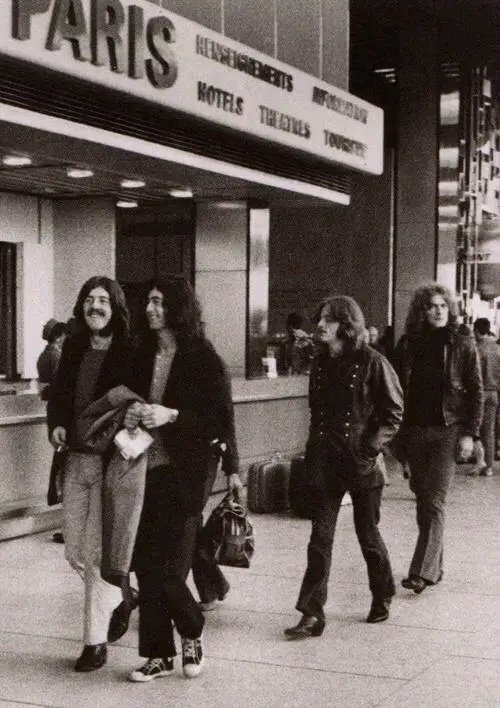“When Thunder Landed in Paris: Led Zeppelin’s 1969 Arrival at the Airport That Marked the Dawn of a Rock Revolution in Europe”
In 1969, the city of Paris was no stranger to artistic revolutions, but when Led Zeppelin touched down at the airport that year, something different was in the air—electric, raw, and ready to shake the foundations of European rock. The band’s arrival in the French capital marked more than a tour stop; it signaled the rise of a new force that would soon dominate stages and stereos across the continent.
Fresh off the release of their debut album, Led Zeppelin, the band—Jimmy Page, Robert Plant, John Paul Jones, and John Bonham—stepped onto French soil not as icons, but as hungry young musicians with something to prove. Yet even then, their presence was magnetic. Airport bystanders and reporters were instantly drawn to the group’s swaggering energy—Plant’s golden curls and piercing gaze, Page’s mysterious composure, Bonham’s quiet intensity, and Jones’s calm confidence.
Photographers snapped away as the band moved through the terminal, lugging their instruments with a mixture of rock ‘n’ roll cool and working-class grit. Fans who recognized them rushed forward, catching a glimpse of the future legends before they exploded into full superstardom. For many in France, this was their first live glimpse of the band that was about to redefine hard rock.
That visit would precede a string of explosive performances in Europe, where Zeppelin quickly outgrew the clubs and vaulted into large venues, powered by the sheer volume, virtuosity, and stage presence that defined their sound. But the airport moment in 1969 captured something rare—the calm before the storm, the moment just before four men ignited a musical firestorm that would echo through generations.
In the years since, photos of Led Zeppelin arriving at the Paris airport have become iconic snapshots of rock history. They remind us that even legends have beginnings—and sometimes, they begin on the tarmac of an airport, with wide eyes, big dreams, and amplifiers waiting in cargo.
